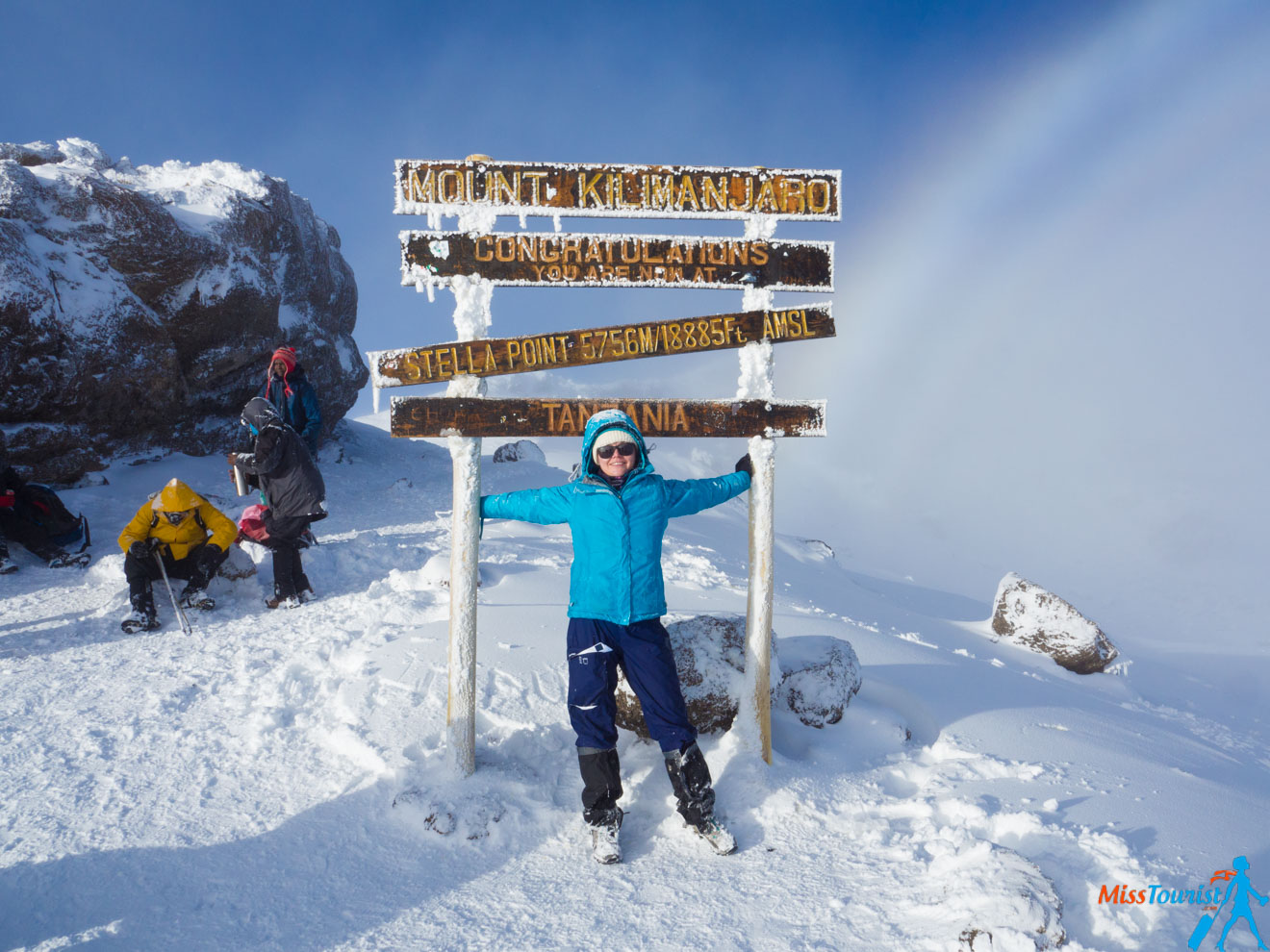
Are you planning to climb Kilimanjaro mountain in Tanzania? Congrats, you are in for a true adventure and a life-changing experience! In case you are wondering what on Earth should you bring with you during this trip, I am here to help!
In this article you can find the ultimate Kilimanjaro packing list, regardless of your chosen route. My list contains everything from clothes to accessories, electronics, and equipment, so you won’t need anything more than this article to prepare for your trip on Kilimanjaro!
Please note that there is a direct correlation between the quality of the items (especially clothes) you are going to take with you and the success rate of the hike. Of course, this is not everything you will need, but it is an important factor, so pack responsibly!
Here is the video where I show you all the things I packed and had with me for climbing Kilimanjaro:
Let’s talk about each of the things you need to pack:
Now let’s talk about each of the things you need to have on your Kilimanjaro packing list:
Contents
General packing guidelines
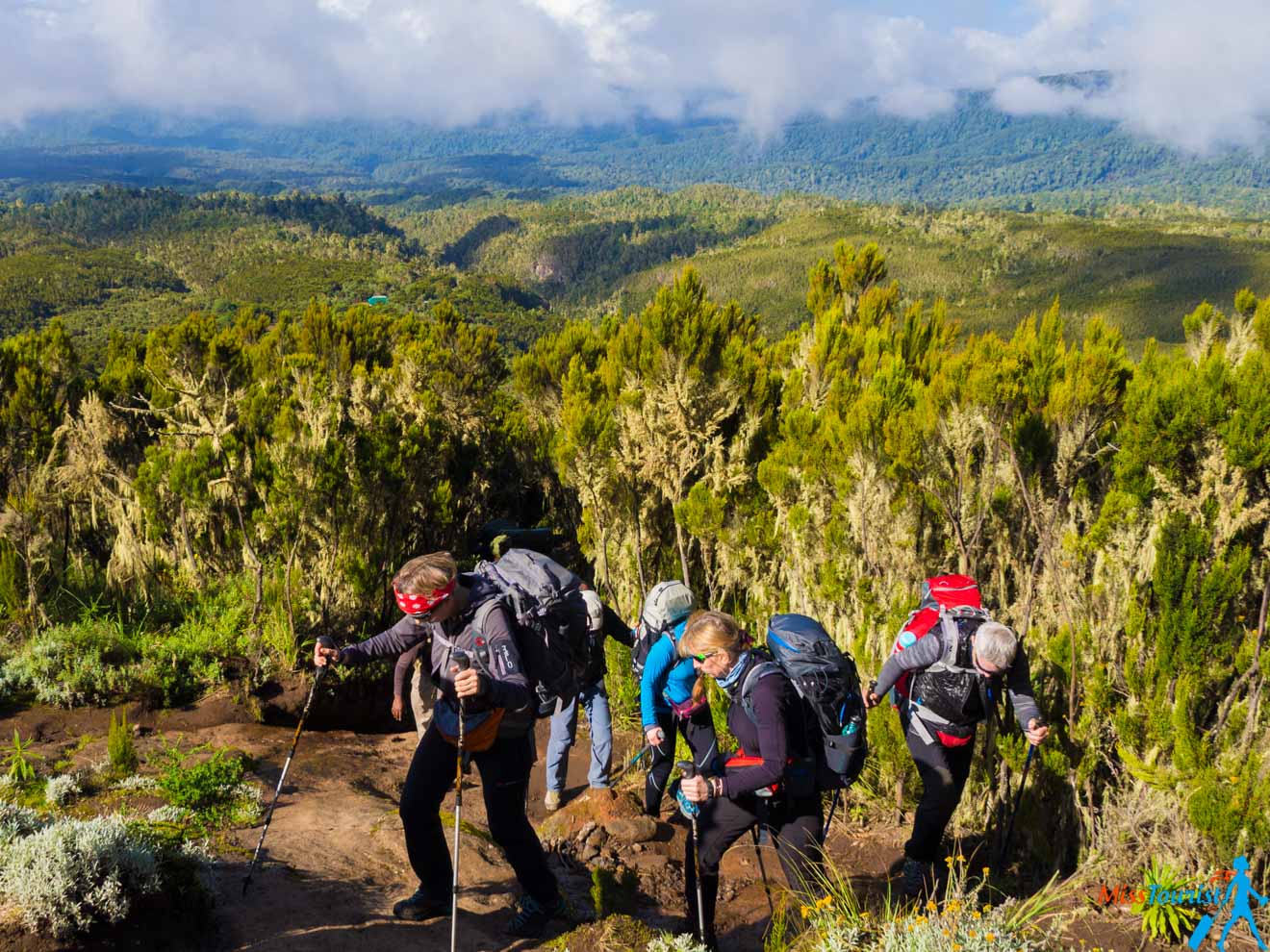
You don’t have to overly stress about your packing list, as you will have guidance!
One day before climbing the trek on Kilimanjaro, your guide will go through all of the things in your bag together with you and he will make an analysis of the items you are missing and the items you don’t need to bring on the mountain.
In case you need something and you don’t have it, they will provide it for you. In my case, I was missing two pairs of underpants from my bag, which my guide brought to me on the day of the summit (I rented them from the summit company, basically). I do not remember the price exactly, but I don’t think it was more than 10 US$ for the whole duration of the hike. If you might want to buy something, there are stores that sell professional equipment but almost certainly it will be a bit more expensive.
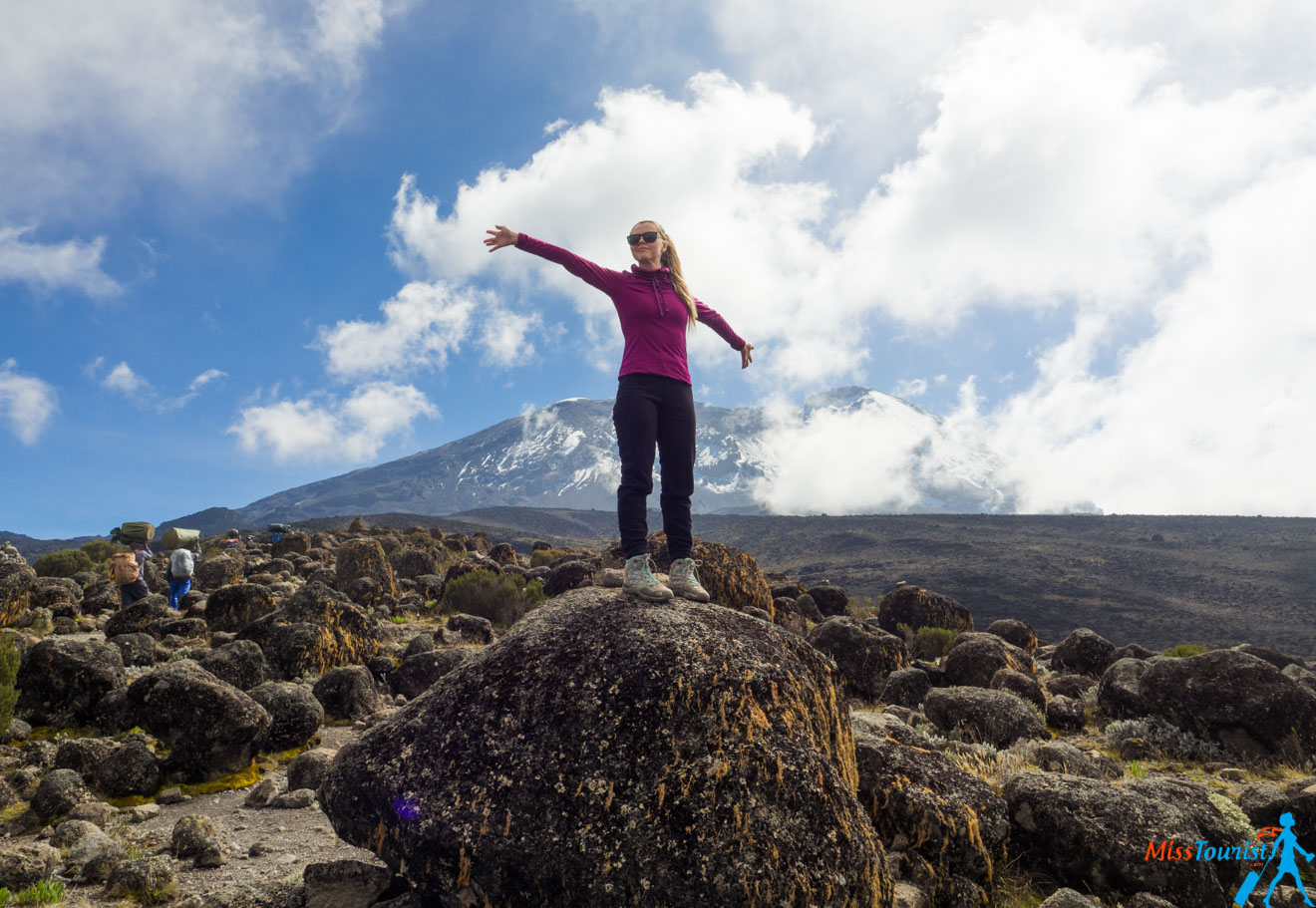
The general rule when you start organizing the items that you need is to not over pack. The trek by itself will be a challenge, but if you pack according to this list, I am sure you will have no problems!
Also, you don’t have to worry about how you are going to carry your bags each day up the mountain! You will have a backpack in which you will have your rain gear, snacks, and water bottle. The rest of the items will be in the duffel bag (duffel bags are big, spacious bags), which is carried by the porters from the hiking company of your choice to the next camp each day.
The duffel bag and all the equipment (tent, sleeping bag) will be provided by the company as well. More details about this below.
By the way, if you haven’t chosen the company you are going to summit with, I have a very good post on questions you should ask the company before you make a decision on booking your trip with them. Click here to read my tips on finding a great tour company for Kilimanjaro.
For your convenience, I have sorted all items for your Kilimanjaro packing list by category so you can scroll down and easily find a specific category for your packing bag. Enjoy:
For your convenience, I have sorted all items by category so you can scroll down and easily find a specific category. Enjoy!
1. Clothes
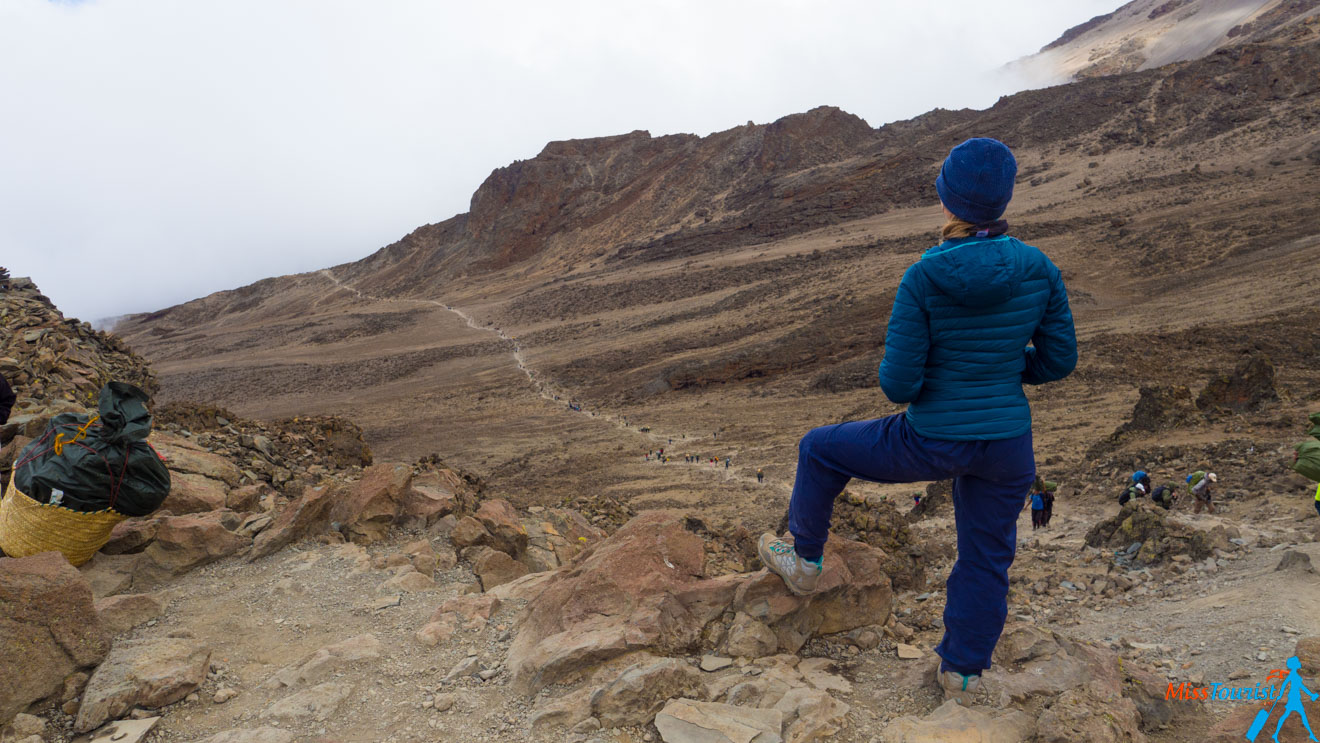
Clothes are one of the most crucial items on your packing list, so make sure to pay close attention to each piece of clothing you will take with you. You don’t want to have inefficient clothes in your bag that won’t keep you warm or help you with layering.
NOTE: I advise you to bring with you clothes made from moisture-wicking fabric, not cotton. This type of fabric will rapidly absorb sweat and will keep you dry and warm.
1.1. Tops
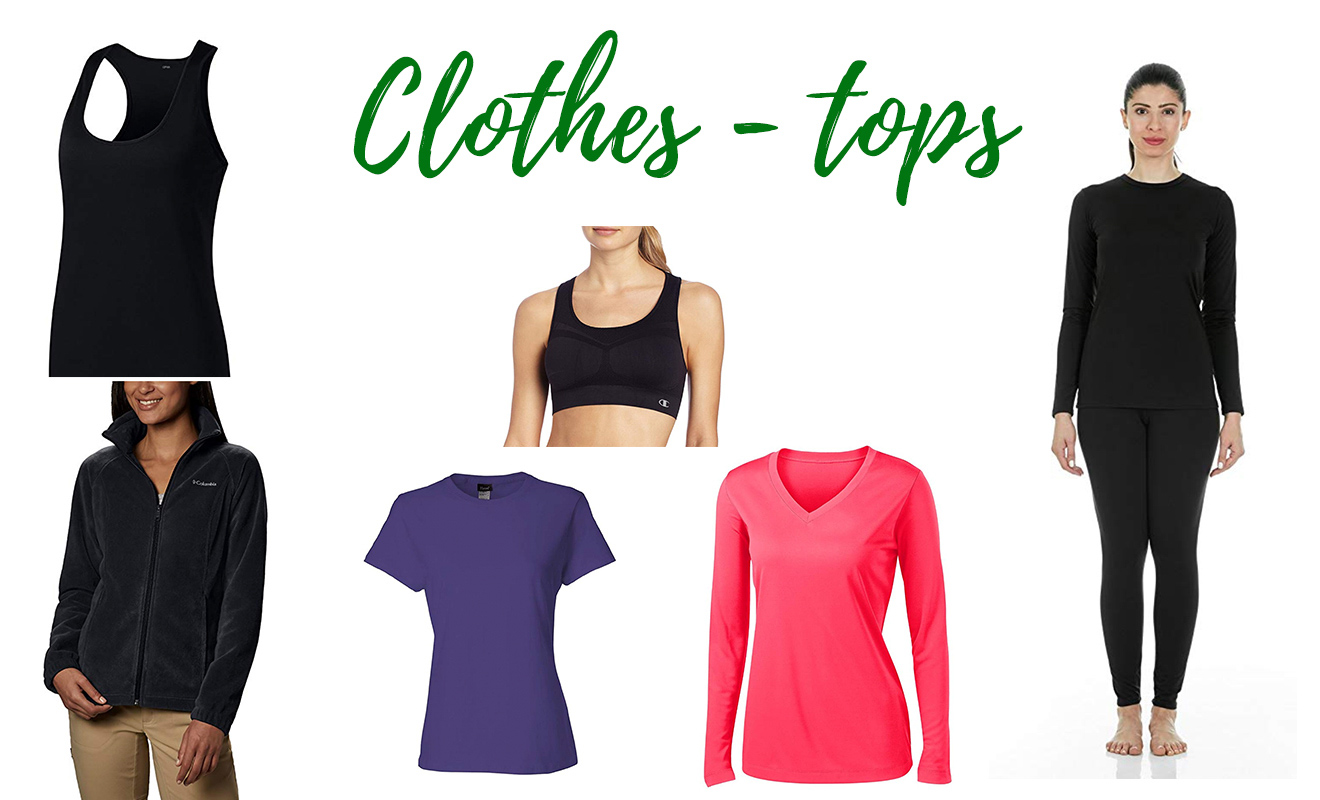
- 2-3 x top tanks and T-shirts – Perfect for layering, the main technique that will keep you warm, regardless of season. Make sure they are made of moisture-wicking fabric, as this will rapidly absorb the sweat and keep a warm layer
- 2 x long sleeve shirts – Made of moisture-wicking fabric as well. I advise you to buy the ones with a front zipper because you can take it off easily if it’s too hot
- 1 x fleece jacket – A super important item; it should be made of fleece or soft-shell, as it won’t take up much space
- 1 x long thermal top – Thermal underwear will keep you warm during the day and night. Except for the summit night, I only used it during the night because it was the only fresh piece of clothing I had left (I remind you there is no showering for the whole duration on the trek 😉 )
- 2 x sports bra – easy to change and comfortable
1.2. Pants
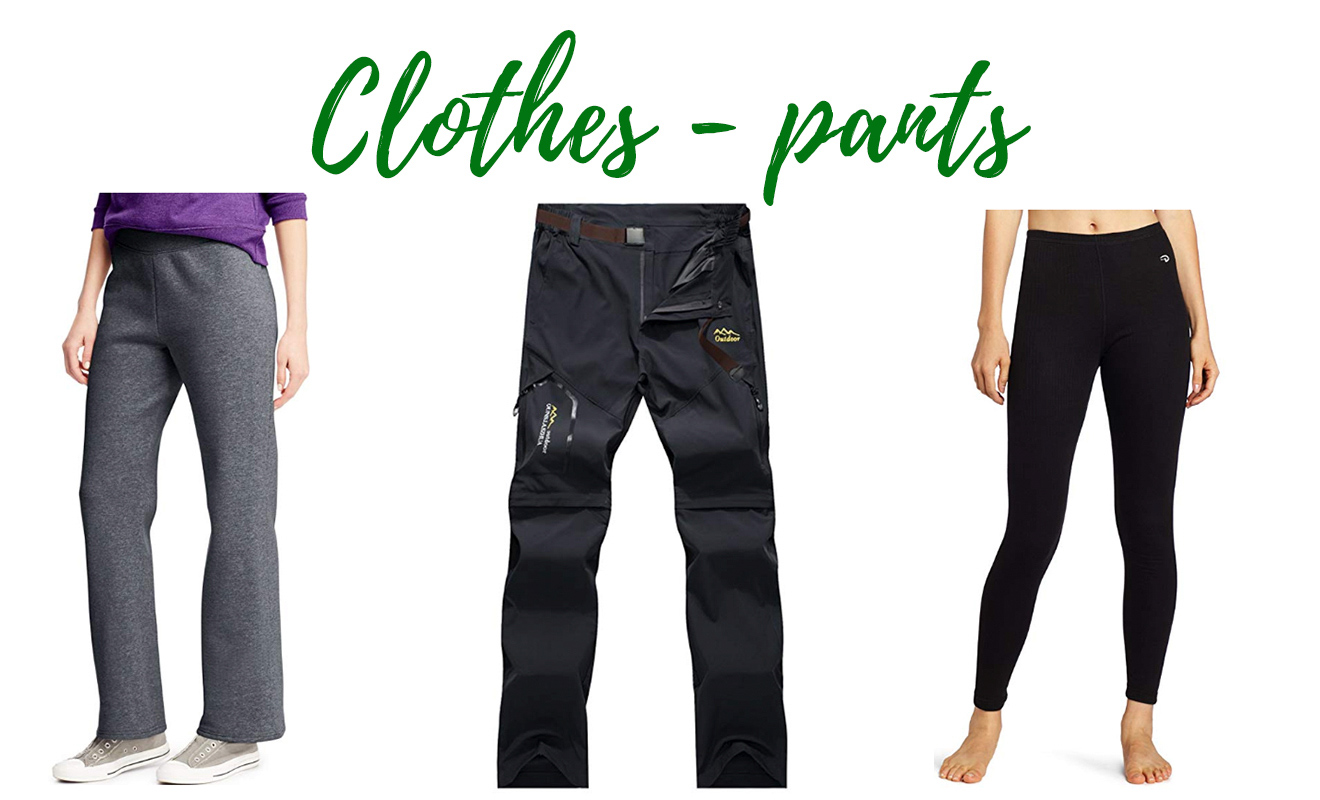
- 1 x convertible hiking pants – the convertible hiking pants which have a side zipper are recommended – they convert from short pants to long pants, super convenient!
- 1 x fleece pants – Make sure you can wear them in layers and they are also perfect for when you are in your camp
- 3 x thermal underpants – Just like the thermal tops, these will keep you warm at all times, you will use all of them on the summit night
1.3. Jackets & Rain Gear
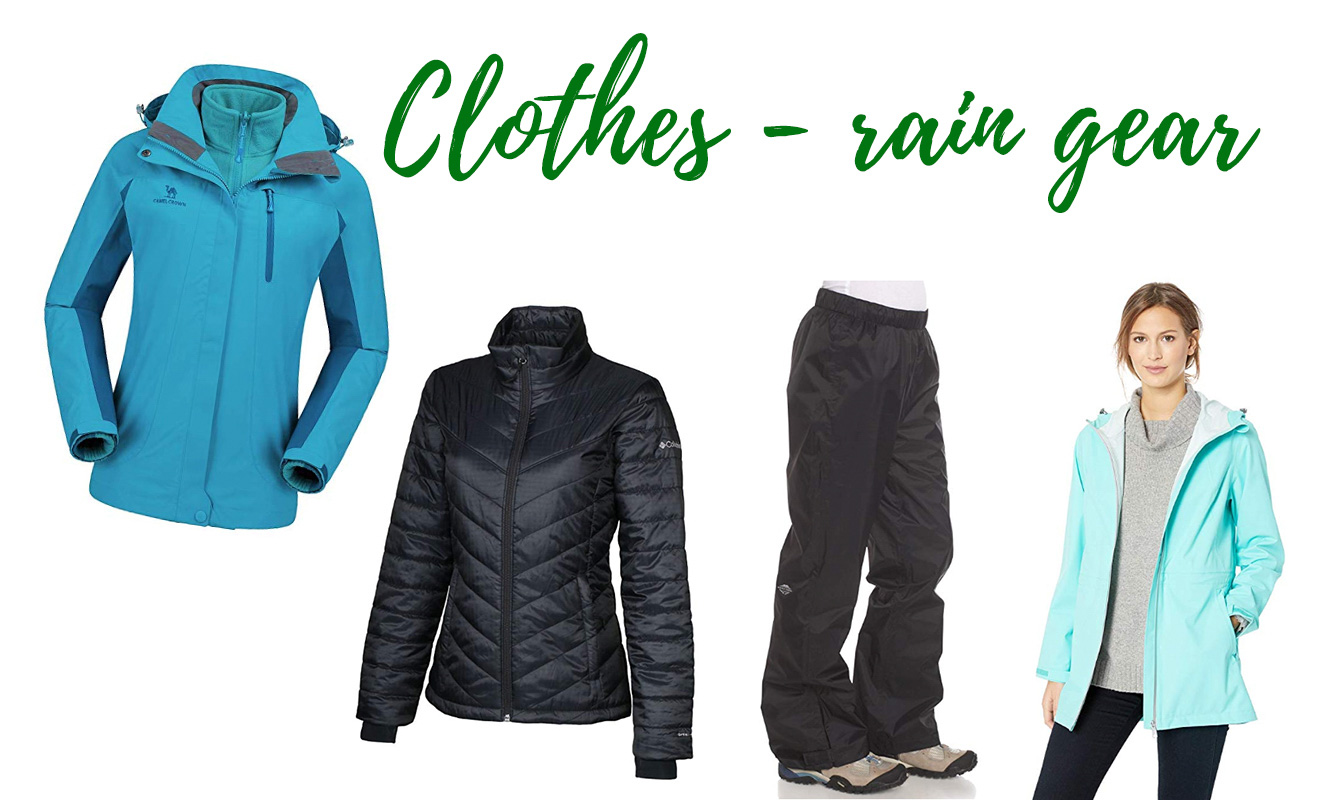
Rain gear is very important because the weather on the mountain is so unpredictable! It may start raining at any moment, so having some waterproof clothing items is crucial. Also, the better quality your rain gear is, the better!
- 1 x waterproof jacket – breathable, it is better to have one with a hood
- 1 x waterproof pants – breathable as well
- 1 x insulated jacket – classic jacket for hiking, made of synthetic material
- 1 x winter jacket – I had a classic winter jacket for skiing/snowboarding with me. Make sure yours is water resistant!
NOTE: You will carry the waterproof pants and the waterproof jacket with you in your daypack every day, so make sure to make it light.
1.4. Headwear & Handwear
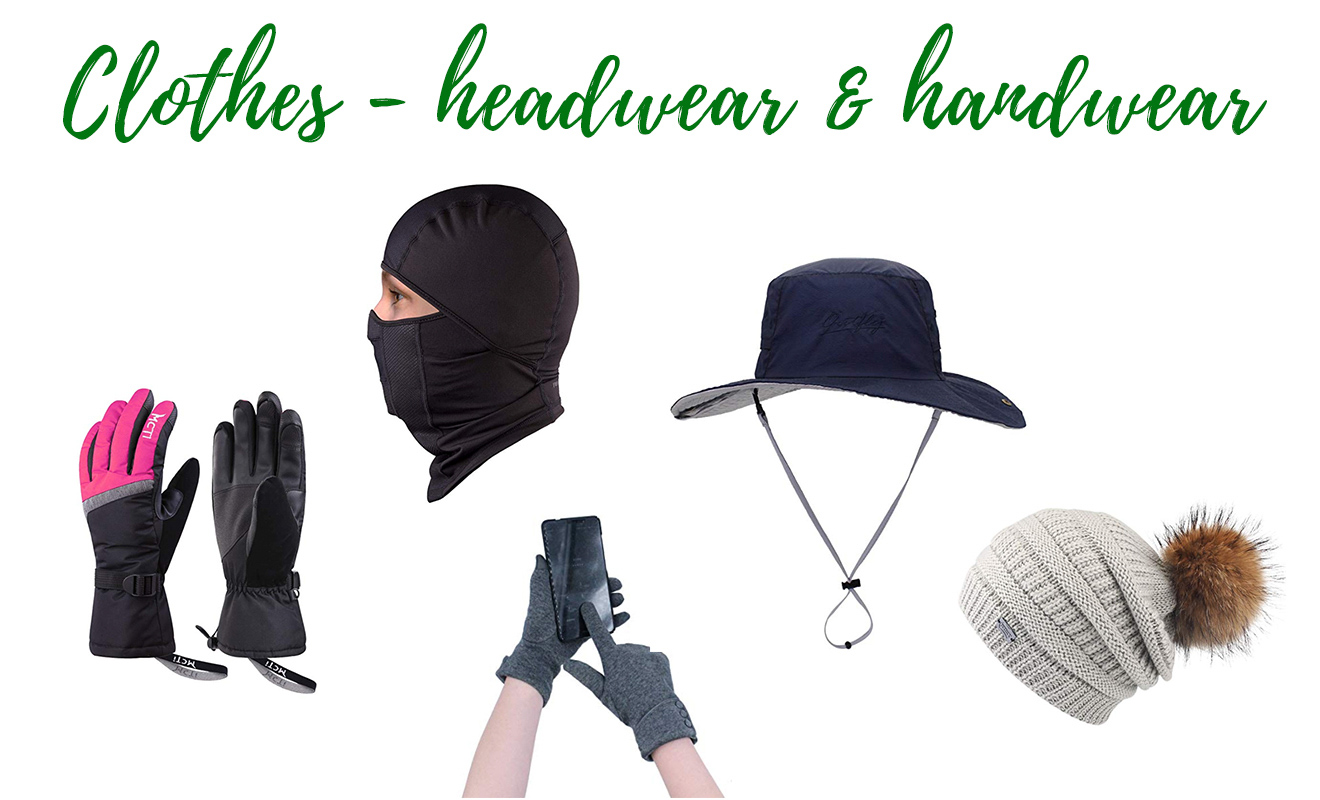
- 1 x warm gloves – water resistant ones
- 1 x thin gloves – I advise you buy the ones with touchscreen functionality – super comfy for the times when you will have to use your phone or touch screen camera
- 1 x balaclava – this is a garment that can be worn in different ways and that will cover your entire head or the neck
- 1 x brimmed hat – it will protect you from the sun
- 1 x knit hat
2. Shoes
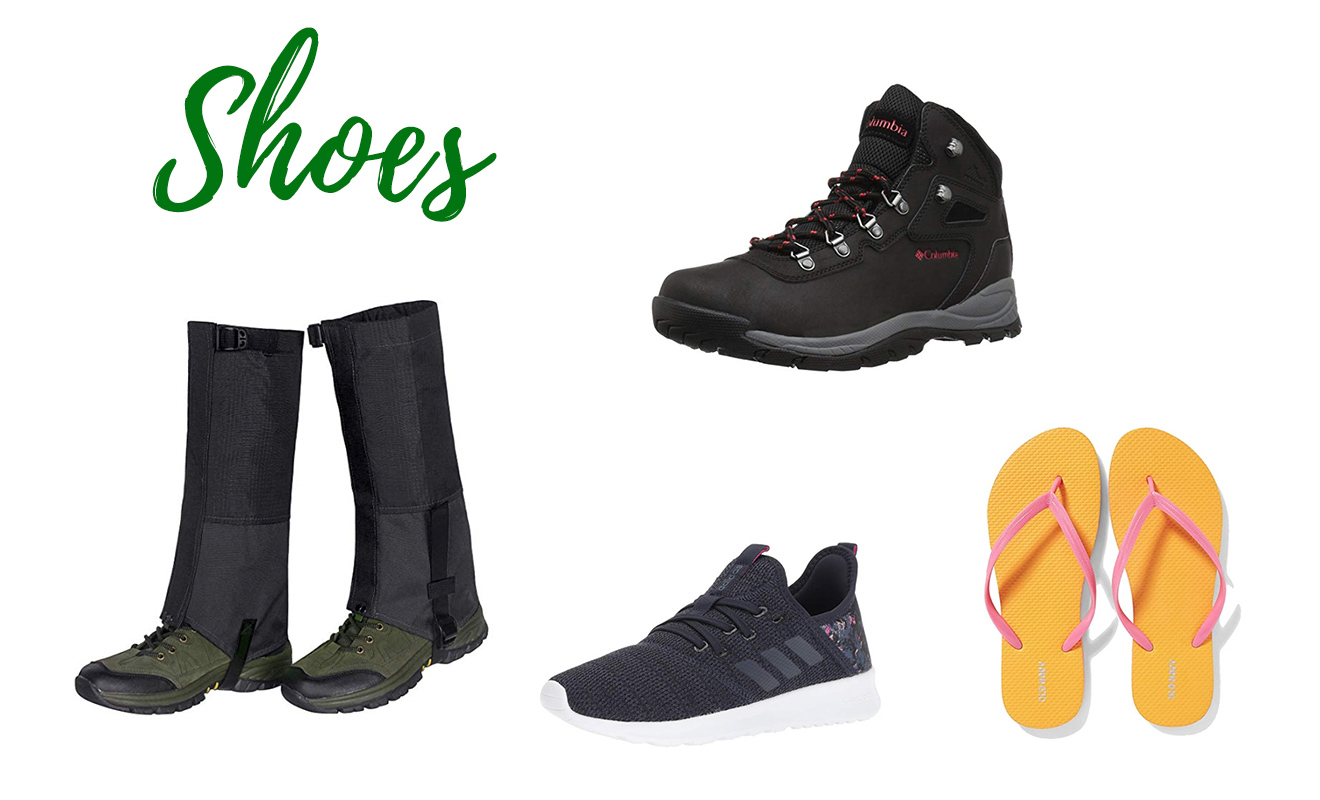
- good hiking shoes – very important! Please make sure you pick the best hiking boots that fit well, that are water resistant and that will keep your ankle fixed
- flip flops optional – if you are taking the Marangu route in Kilimanjaro (the name of the shortest route; some other routes are Western Breach or North route), you will stay in huts, so having some inside shoes is mandatory so you can wear in the camp base
- sneakers – optional, as you will only use them on the first day of hiking or at the camp (in case you are taking Marangu route)
- gaiters – special devices that strap over the hiking boots; they’re like a protective shell for your legs against mud etc. This is an optional item (I only wore mine on the summit night), but they can be very useful for wearing each day if you want to
- socks – merino wool or synthetic are recommended, not cotton
Subscribe here to get up to 35% off your accommodation for your next trip!
3. Toiletries
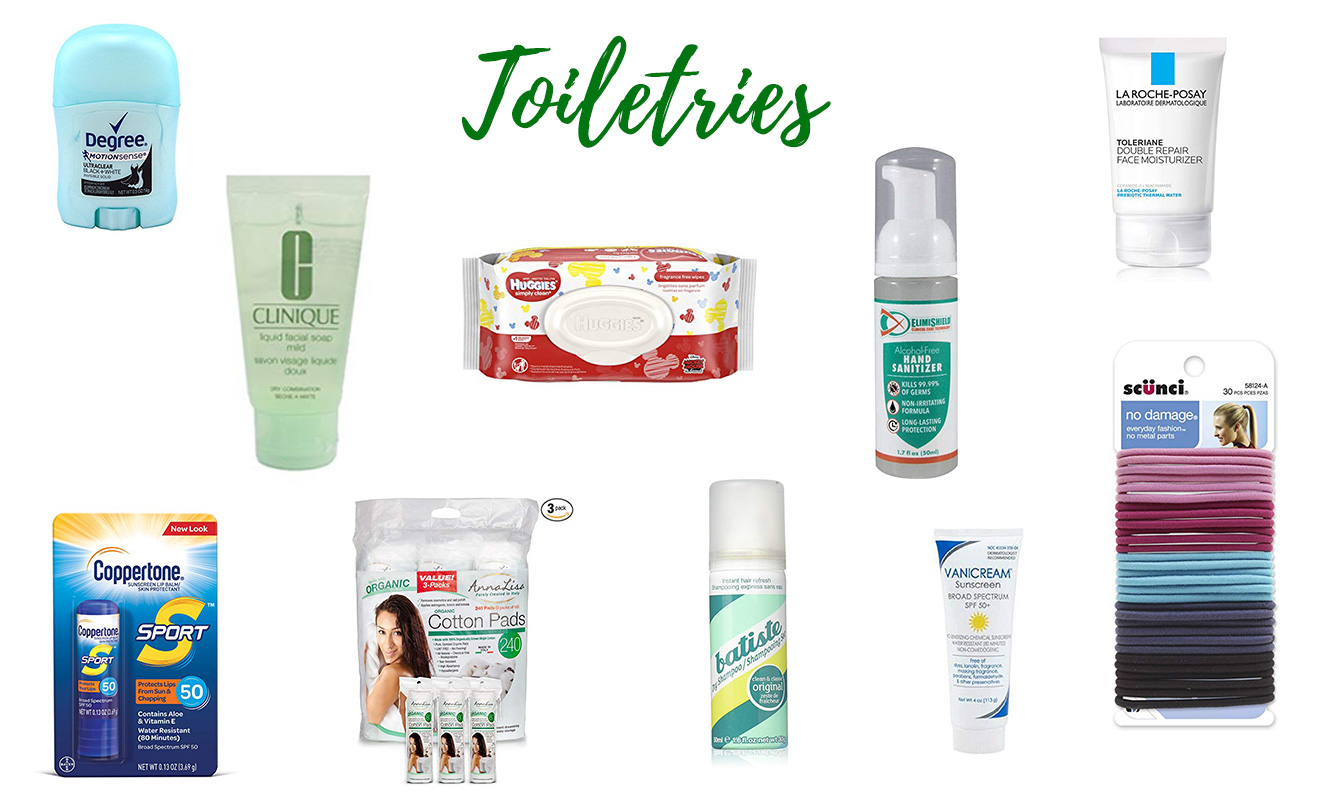
As I mentioned before, I advise you to pack as light as possible. There is no point in packing and carrying a shampoo or a perfume with you on Kilimanjaro, as you will, most probably, not use them. Stick to the essentials instead.
Your make-up case should contain:
- a deodorant
- a lip balm – very important, the sun is super strong and you would definitely need it!
- a small moisturizer – you can bring a small container which you fill with a good moisturizer; very good, especially for girls
- a face cleanser – I used a travel konjac sponge which helped me clean my skin fast; you only have to dip it in hot water
- sunblock SPF 50+ – a very important item as well, as the sun is strong and you don’t want to get a sunburn
- some hair ties – in case you have long hair
- cotton pads – travel-size are better, as they are smaller and don’t take up much space
- baby wipes – my advice is to have a big pack of wet wipes in your duffel bag and a small travel size one in your backpack to carry with you every day
- hand sanitizer – efficient and easy to use
- toilet paper – even though your guide will have plenty of toilet paper for you during the hike, you might want to have your own
- a dry shampoo – optional, but you may want it in your kit. I had one with me but ended up not using it because I feel like I’d have to wash my hair at least a day after using it
4. Electronics
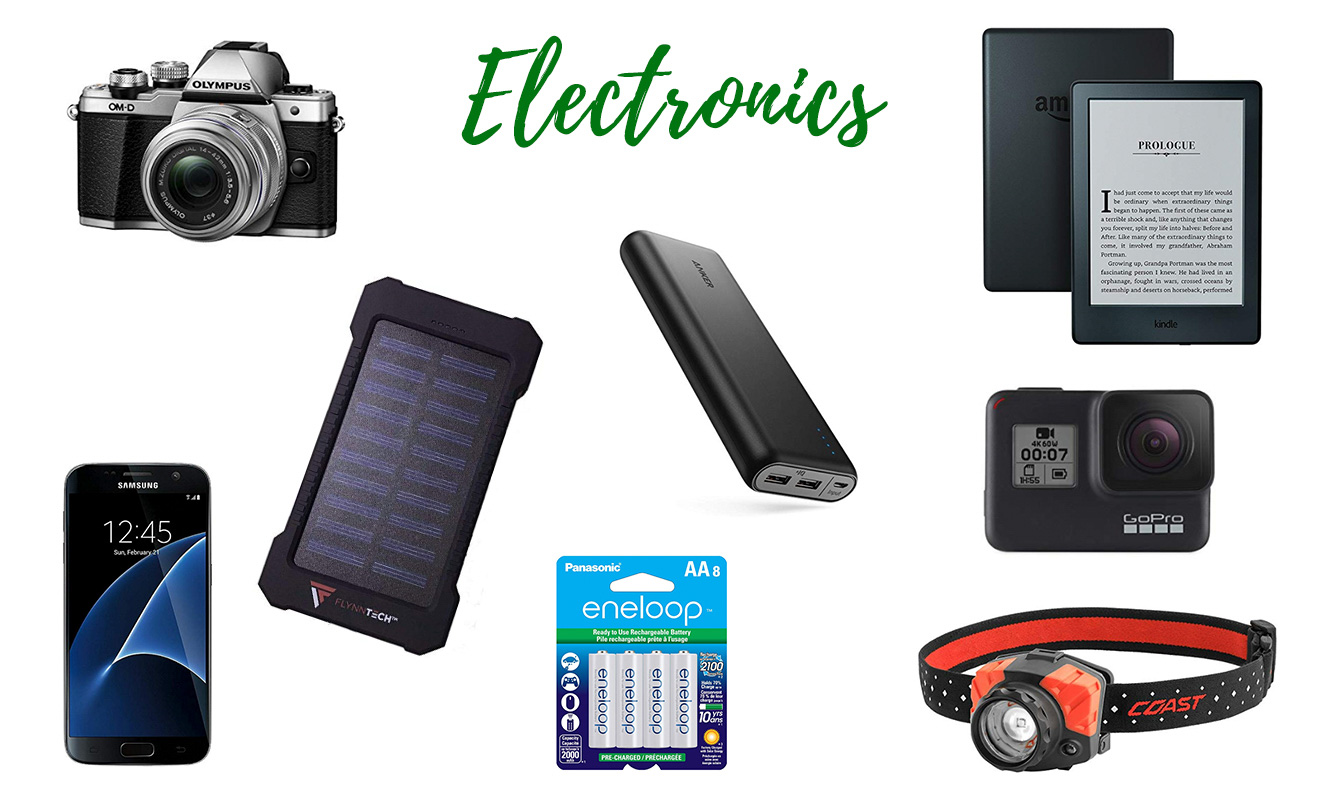
It is not recommended to take many electronic devices with you on Kilimanjaro, as you will most probably not use them on the mountain and you won’t be able to charge them in any way.
Here is what I brought with me:
- camera – I have an Olympus OM-D E-M10 II – it is compact and it takes amazing photos!
- phone – I have a Samsung Galaxy S7
- Kindle – if you have one and you like reading on it, it is a very good item to bring on the hike. There will be some times at the tent when you will not have much to do, so having a good book on your Kindle will help you pass that time
- GoPro – unfortunately, because of the cold, the batteries from my GoPro drained until I reached the peak even despite the fact it was fully charged, but I did take some great shots with it in the previous days
- a headlamp – a very important item as well, useful for reading on the Kindle or a book during the evening. The lamp with new batteries is usually good for 120 hours, so it is more than enough for your track
- some spare batteries – for the electronics that require it
- a portable battery charger – essential to charge the electronics above. Or, if you prefer, you can take a solar battery (but it really depends on how much sun you will have during your trek)
5. Equipment
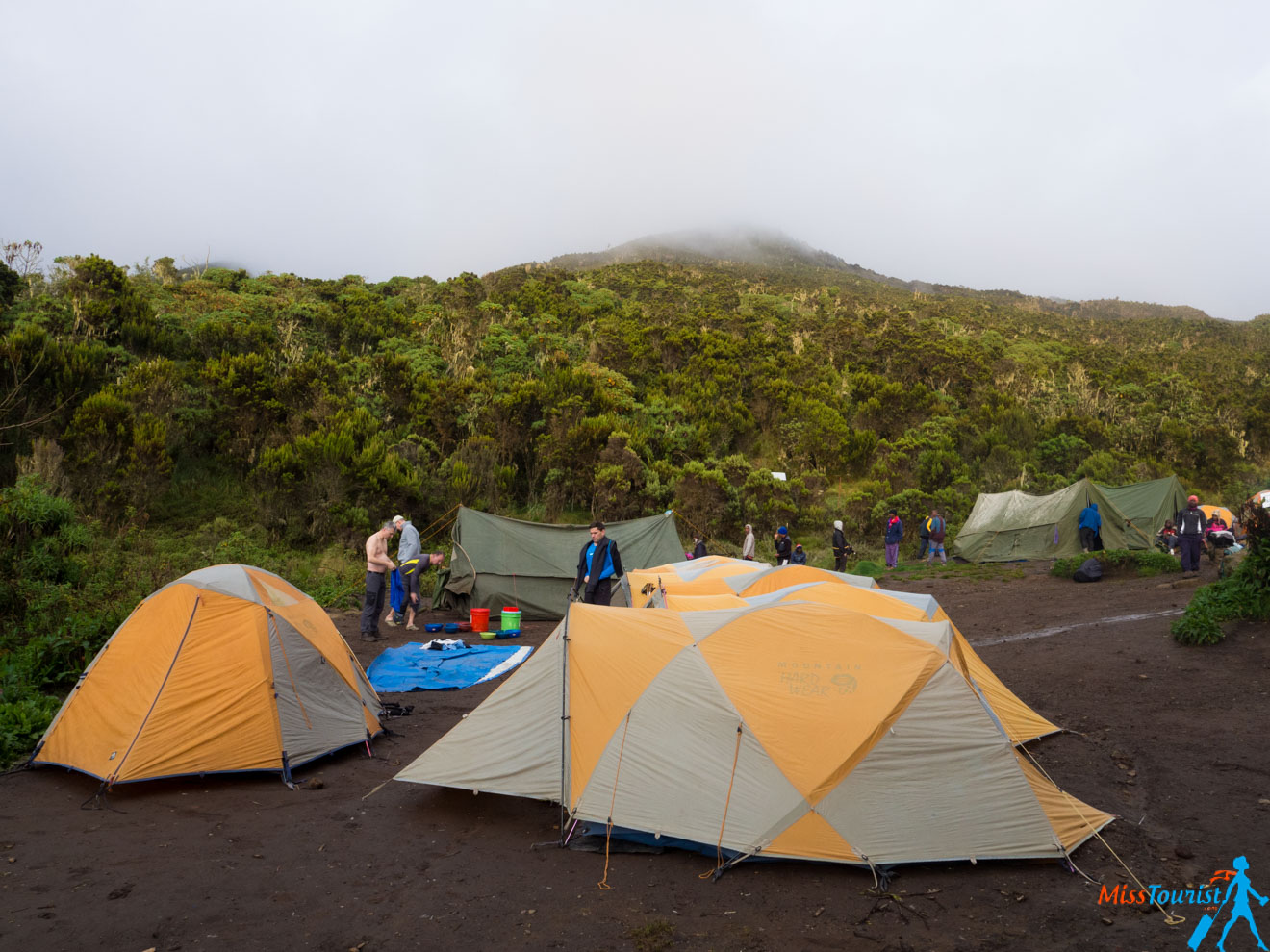
As I mentioned before, all the big equipment (tent, sleeping bag for Kilimanjaro and duffel bag) you will need for your trek on Kilimanjaro will be provided by the hiking company. They will provide these for you, as well as carry the bags and install everything at the next camp each day.
In my case, everything was of good quality and I had no problems. If you wish to bring your own tent or your own sleeping bag with you during your travel, that is no problem, of course (it will be carried by porters).
6. Accessories
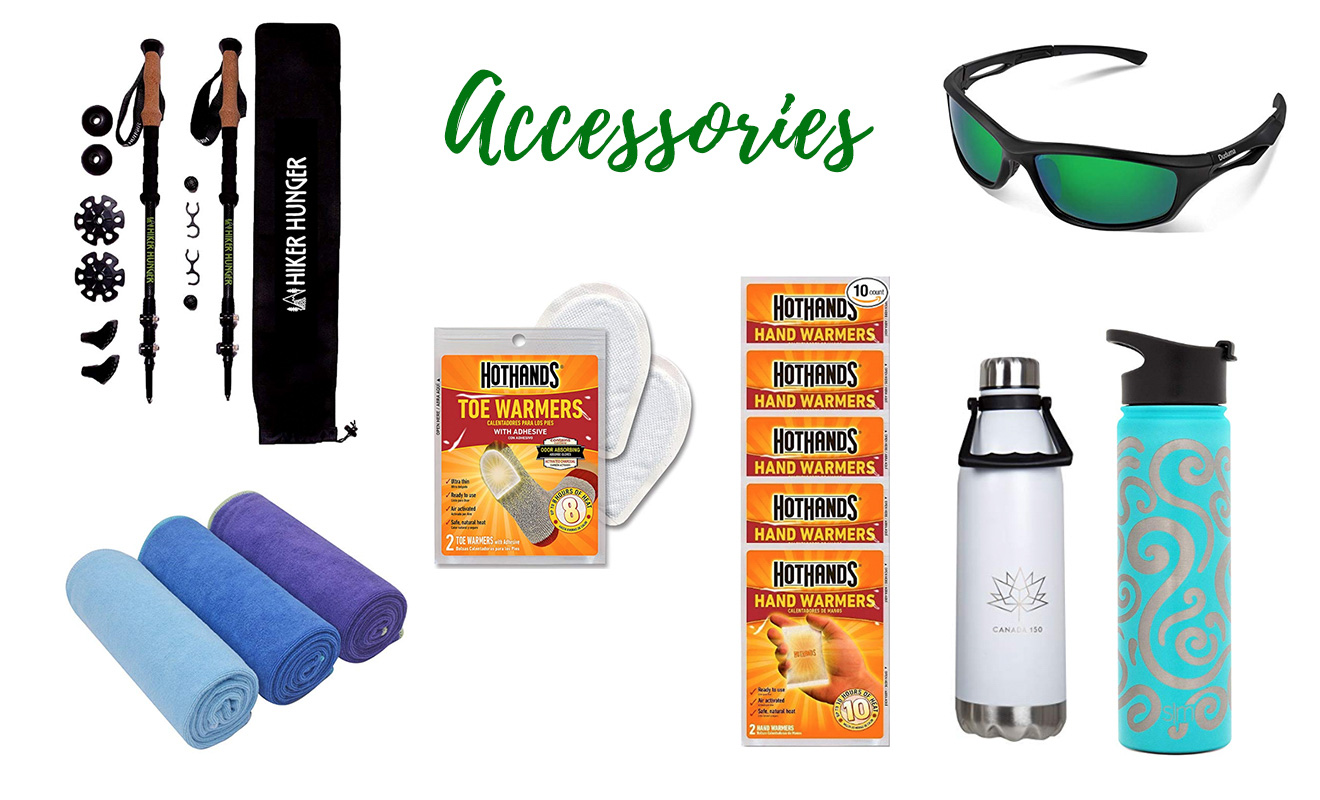
- a pair of collapsible trekking poles – I recommend having the collapsible ones on your gear list because they don’t take up much space, they are light and very useful, I use them in all my hikes for years now!
- a pair of sporty sunglasses – make sure you have polarized lens on them, as they will protect you from the sun
- a travel water bottle or a thermos – please note that you cannot bring any one-time-use plastic bottles with you on the mountain. I advise you to take a metal water bottle or a thermos of at least 1.5L with you. My guide recommended 3L of water per day with you in your backpack, but I had 1.5L and it was fine. When you buy a thermos in Tanzania, it is recommended to make sure they give you a new one because they tried to sell us a used one first. Or just buy one yourself before departing. I saw other climbers using water packs, my personal opinion is that these are also quite comfortable as you don’t have to stop for a drink.
- a microfiber towel – the ones that are used in gyms are perfect; they dry really quick and they are super light
- hand warmers and toe warmers – I forgot to bring these with me, but I consider them super useful (although optional) to warm your hands and feet fast during this travel
7. Backpack
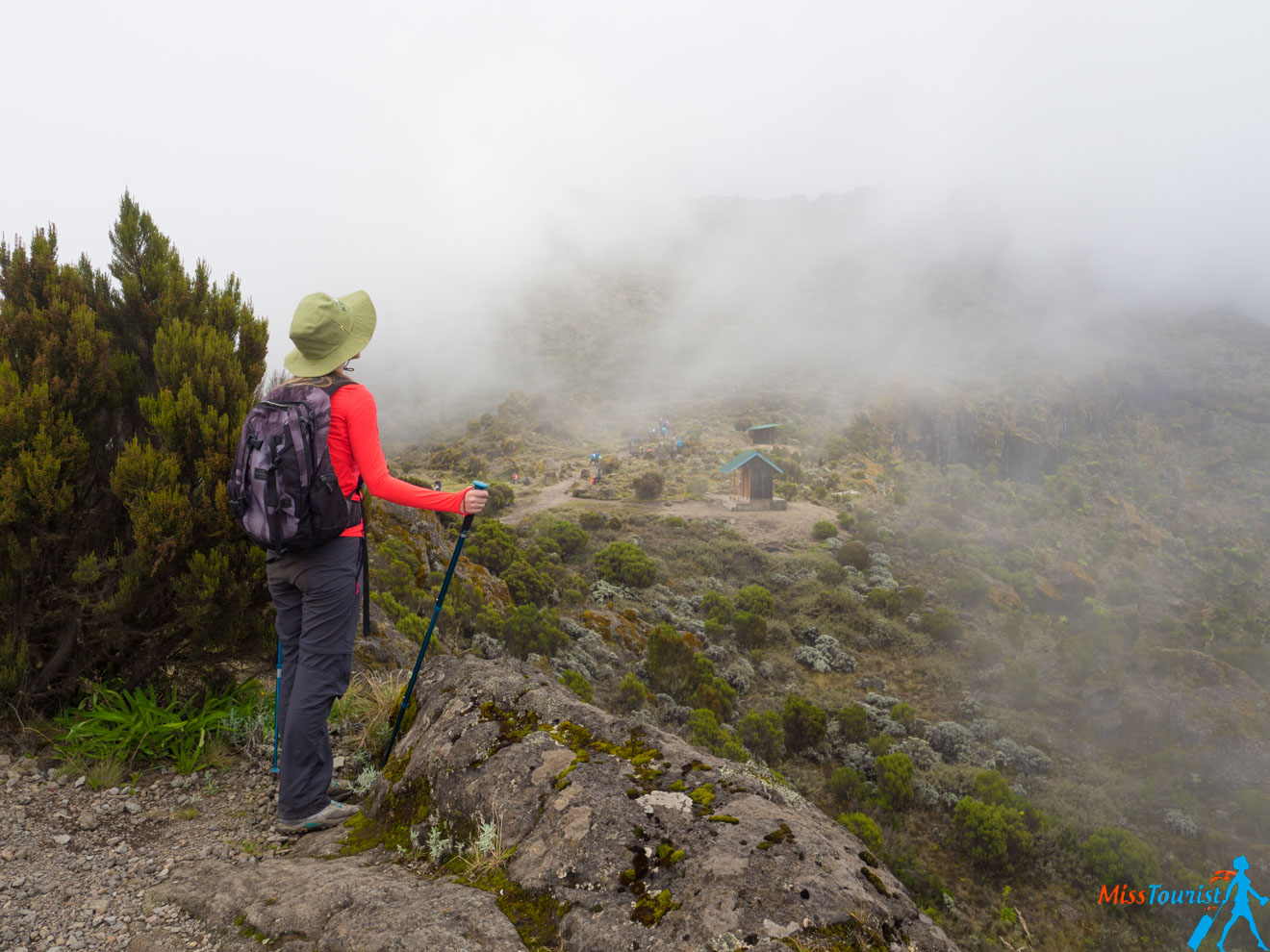
The backpackthat you bring with you when climbing Kilimanjaro is recommended to be water resistant and spacious enough (25-35 liters) for the rain gear, snacks, and water bottle. Also, another very important aspect of the backpack is to have the adjustable waist and chest straps – these will help the weight distribute better and it will be less pressure for your shoulders.
8. Snacks
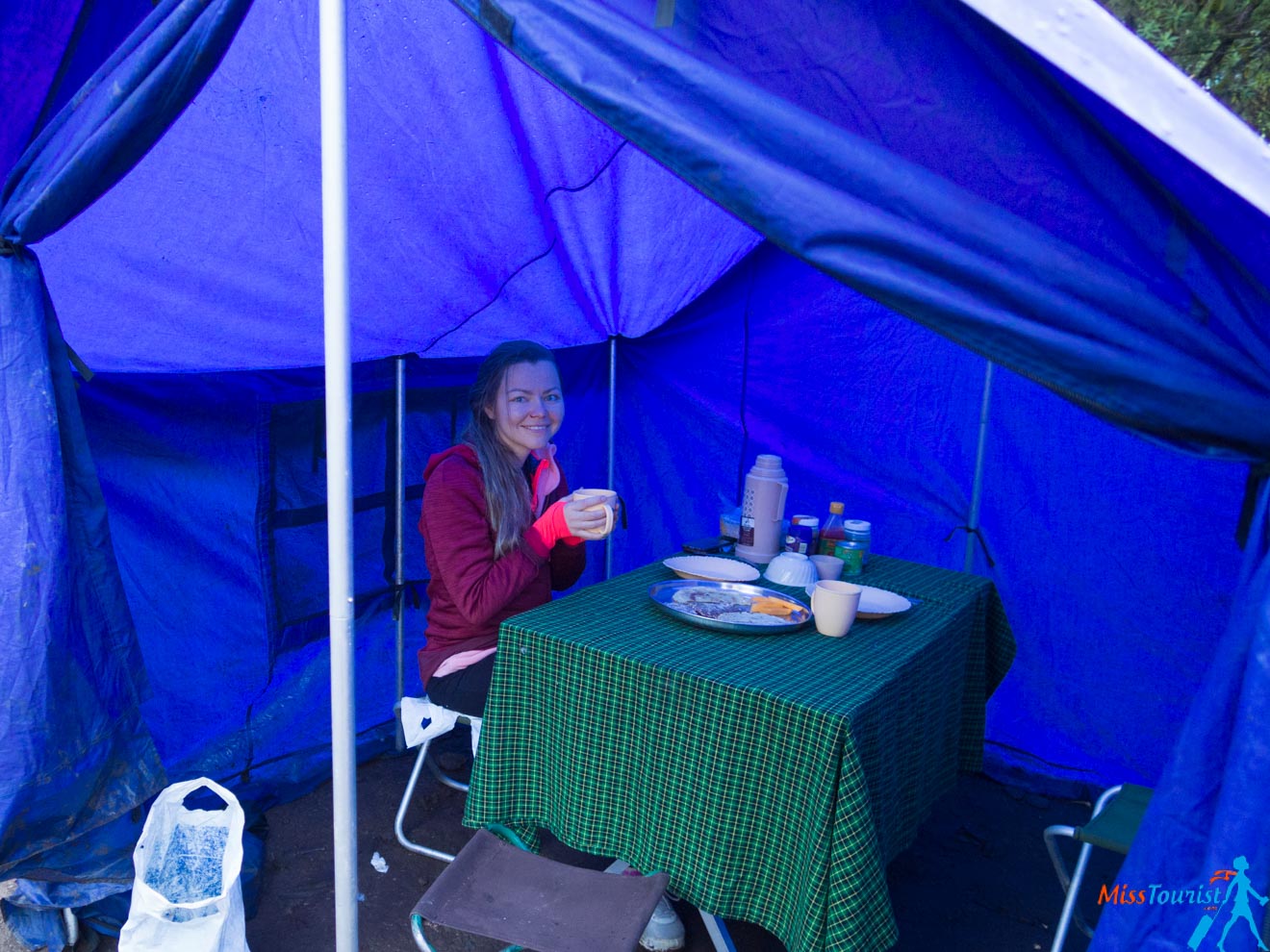
During your trek on Kilimanjaro, you will eat 3 meals per day provided by the hiking company. The food is plentiful and of very good quality, but it is still recommended to take some of your favorite snacks with you to have in your backpack during the day, just in case you get hungry all of a sudden. I recommend having 2 snacks/day with you, just in case.
WHAT TO TAKE: Some recommended snack options are protein bars, chocolate bars (such as Snickers), nuts and potato chips. Of course, you can bring your favorite snacks with you from home if you want. If not, there are shops before the starting point where you can buy these without any problems.
9. Optional Things
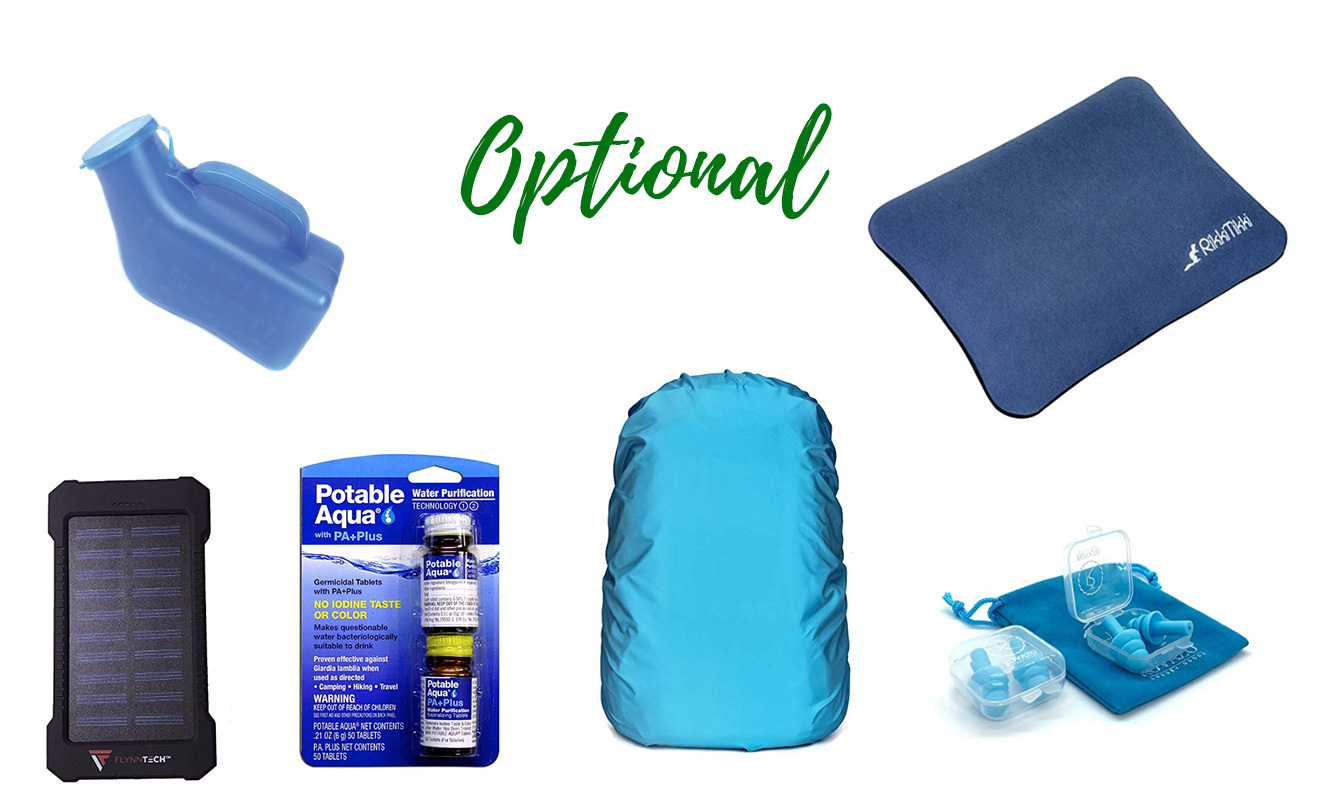
The list above is more than enough to prepare you for climbing Kilimanjaro, but here are some optional things you might want to take with you, just in case:
- an inflatable pillow – you may need a pillow to sleep well in general, in which case an inflatable pillow that doesn’t take up much space at all can be life-saving
- a portable solar charger – this is an alternative to the portable charger, but it really depends on how much sun you will have during your trek on Kilimanjaro. If it is going to be cloudy, it won’t be as efficient as a normal portable battery.
- a pee bottle – in case you will not want to get out of the tent during the night to use the toilet
- earplugs – if you are a light sleeper, these are very important because the noise isolation is almost non existent when you sleep in a tent
- water purification tablets – the water quality there was very good, as it all comes from natural springs and the guides are also boiling it to make sure it doesn’t have any microbes. If you want to be extra-safe, you can take some tablets with you, just in case
- a waterproof backpack cover – even if your backpack is water resistant (and especially if it isn’t), you may also take a waterproof cover for it just to be safe.
10. Medication, documents and money
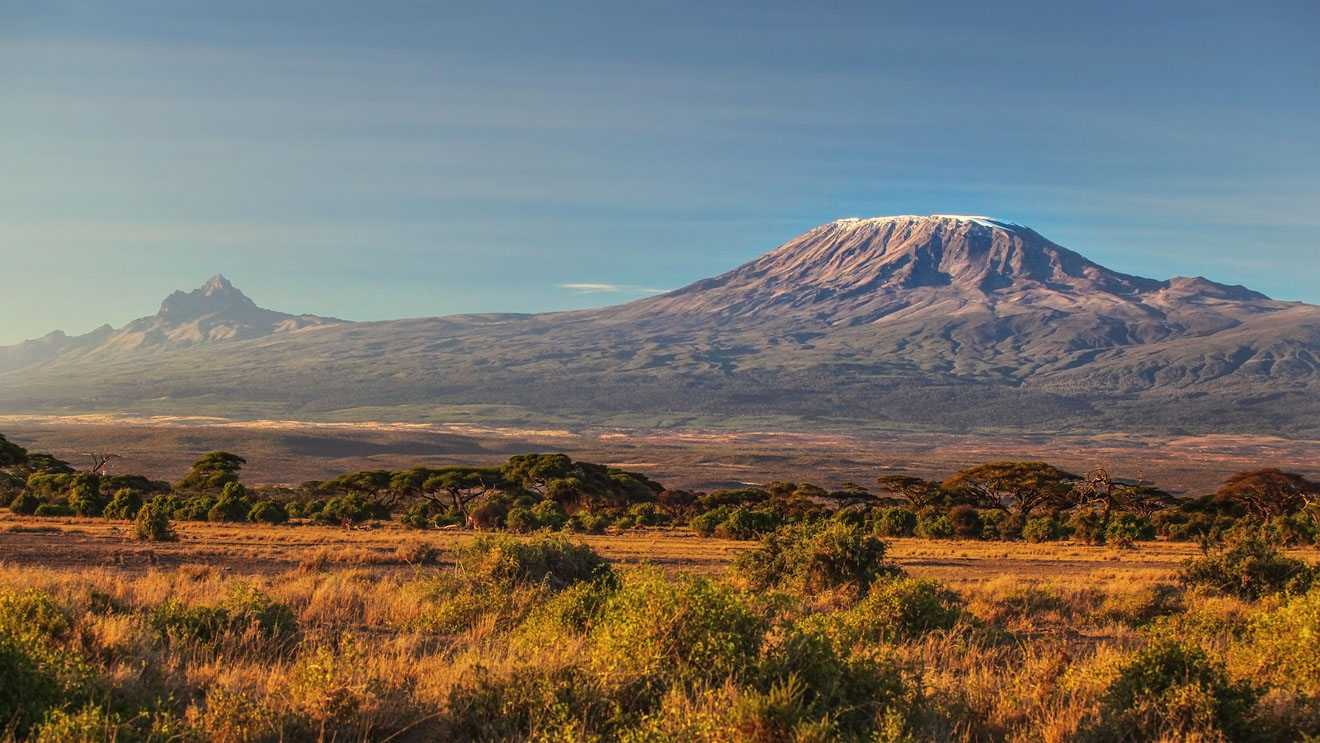
10.1. Medication
Although the Kilimanjaro guides will make sure you will have all the items you may need, all the equipment, medications and good food, they do not actually check if your health status allows you to do the summit. I strongly advise you to go to your doctor for a consultation before planning this trip and ask if you are medically able to climb Kilimanjaro. For example, people with asthma are not allowed to summit the mountain.
The guides will have all the basic medications with them for you (such as pain killers or altitude sickness pills – Diamox), but if you have any special prescriptions, make sure to bring your pills with you. Make sure you also have insurance for Kilimanjaro!
10.2. Documents
You may leave your passport at the accommodation before the trek together with your big luggage if you want to. I personally decided to take my passport with me, but keep in mind that if you decide on leaving it aside, you will need a copy of your passport when you enter the Kilimanjaro National Park.
10.3. Money
You will have to carry some cash with you for tipping the team (porters, assistants and cook) after the summit. You can find more details about how much exactly to tip and everything else about this trek on my article about 7 things you should know before climbing Kilimanjaro
| 🏔️ Clothing: | Layered clothing |
| 🥾 For hiking: | Waterproof clothes and shoes |
| 🔋 Electronic devices: |
Camera, headlamp, solar battery
|
| ☀️ Best month to climb: | January and February |
| 📅 How many days: | 6-7 |
Conclusion
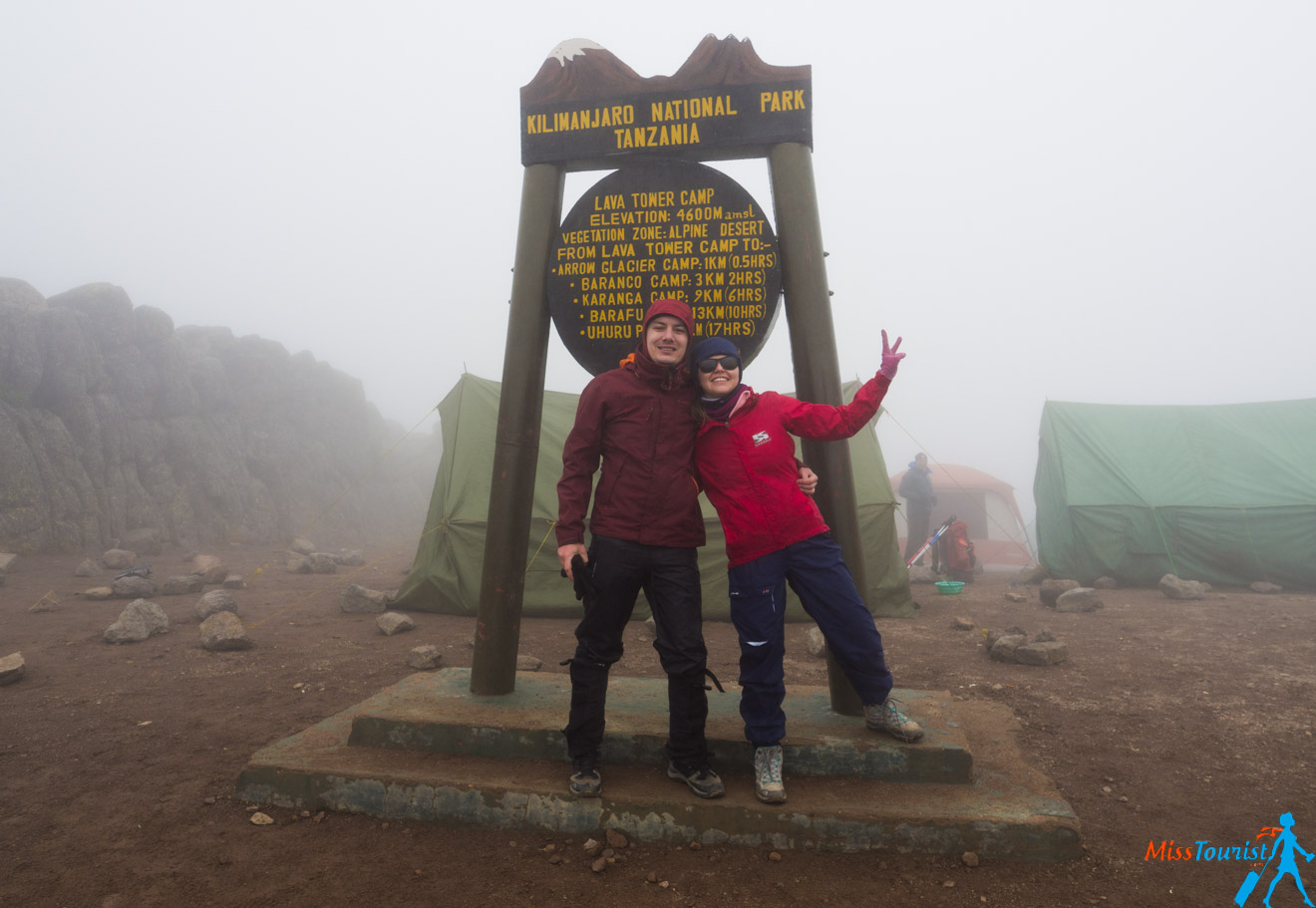
That was everything I needed in my Kilimanjaro packing list and my climb was successful! I am sure that if you make sure you’re following this complete list of things you are required to have for your Kilimanjaro hike, you will be able to do it as well!
The experience itself is incredible, life-changing and definitely worth it, so if you buy all the gear and things you need in advance, there is nothing that can stop you from going up high on the summit.
REMEMBER: Try not to over-pack and do not be very stressed about the hike itself. If you prepare well and you have the right mindset (you can do this!), the mountain will welcome you.
I hope that, after reading this article, you will feel like you can do this hike on Kilimanjaro without any problems, so get ready to pack your bags!
If you still have some questions and concerns, please leave them in a comment below – I am happy to answer with more details and advice!
Good luck!
Yulia
Pin it for later!
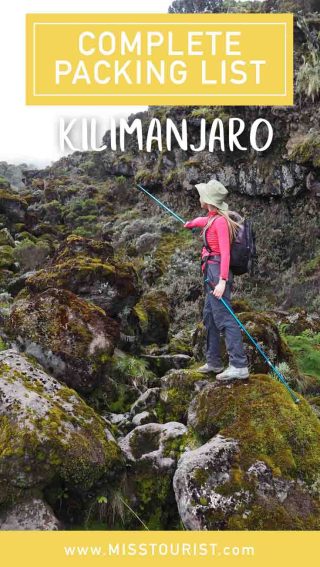
Pin it for later!
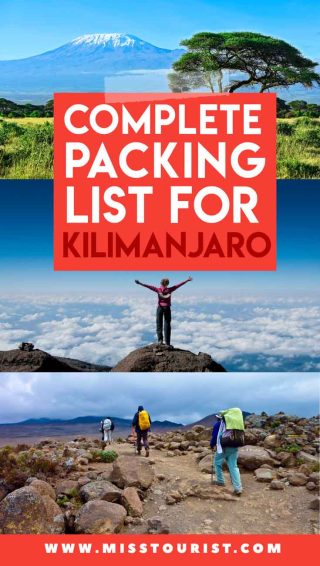

 Yulia Saf
Yulia Saf 






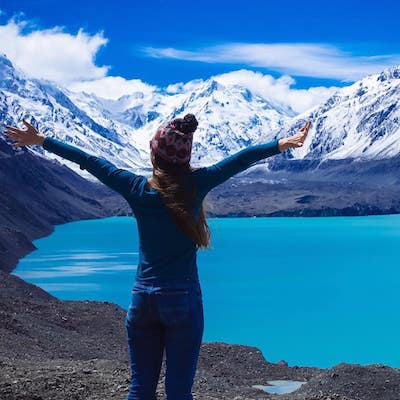
hi Yulia
i read all the subject about Kilimanjaro packing list
and will apply all the tips and advices.
i’m planning to do it at the end of June 2024
my question :
is this time is suitable to do the Kilimanjaro ?
thanks
Hi Amin,
Yes, June is considered a good time to climb Mount Kilimanjaro because of its weather and fewer crowds.
I hope you have an amazing time!